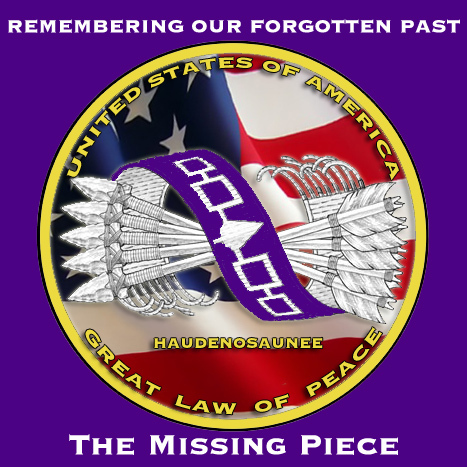With election season in full swing, Columbus Day around the corner, and people waving their flags for American Democracy, I thought it might be good to shed light on some interesting historical facts about our republic. Some hot topics in the election include women's issues, immigration, and the environment. Counsels of Iroquois Natives had put a lot of thought and discussion into these issues almost 300 years before America declared her independence in 1776. The Iroquois Confederacy was based on The Great Law of Peace and much of the original teachings were adopted and incorporated into The United States Constitution. Now is a good time to consider The Great Law of Peace in light of the pressing issues of our day.
"The Iroquoian system, expressed through its constitution, "The Great Law of Peace," rested on assumptions foreign to the monarchies of Europe: it regarded leaders as servants of the people, rather than their masters, and made provisions for the leaders' impeachment for errant behavior. The Iroquois' law and custom upheld freedom of expression in political and religious matters, and it forbade the unauthorized entry of homes. It provided for political participation by women and the relatively equitable distribution of wealth." (Bruce Johansen, "Forgotten Founders")
The extension of liberty and political participation to women, who nominated the male leaders, was also an important part of The Great Law of Peace since the 1400s.
Meanwhile, during the same century that The Great Law of Peace was founded by The Haudenosaunne (Iroquois) in the Northeast, Christopher Columbus arrived as an immigrant to The New World. Today many people prefer to call Columbus Day "Native American Day" to acknowledge the many thousands of natives who were in America before it was "discovered." Pope Nicholas the fifth issued a Papal Bull which gave Christian explorers the "right" to claim lands not inhabited by Christians for exploitation and "discovery." It was also stated that "Pagans" could be converted, enslaved or killed while the land and spoils would belong to Catholic Monarchs in Europe. Many people today claim that America was founded on "Christian Values" though history shows that the conditions of "discovery" by Columbus and Conquistadors were far from the principles taught by Christ according to the New Testament.
Currently, America spends 10 times more on military and war than on healthcare, housing, and education. We hear people talk of tax-dollars going towards healthcare, housing and education as if it is socialism, but we never hear of war as a socialist plot or an entitlement... Regardless, I find it comforting (and ironic) to know that the founding principles of our republic were based on liberty and peace. Article 24 of The Great Law of Peace stated "The chiefs of the League of Five Nations shall be mentors of the people for all time. ...they shall be proof against anger, offensive action, and criticism. Their hearts shall be full of peace and good will, and their minds filled with a yearning for the welfare of the people of the League. With endless patience, they shall carry out their duty. Their firmness shall be tempered with a tenderness for their people. Neither anger nor fury shall find lodging in their minds and all their words and actions shall be marked by calm deliberation." (Akwesasne Notes, 1977) It is clear to see why Ben Franklin and the Founding Fathers had such a deep respect for these indigenous teachings as they actually mirrored Christian teachings in the New Testament. It also makes me wonder what our elections or foreign policy would be like today with that kind of respect, honor and statesmanship?
"In the Indian character resided a fierce individuality that rejected subjugation, together with a communalism that put the welfare of the whole family, tribe, or nation above that of individuals." (Bruce Johansen, "Forgotten Founders") America is the land of the individual and it should stay that way, but not at the expense of the whole family, tribe, nation, or planet.
Is it possible to love America, our roots and also recognize that we are part of a global community? Our polluted air and water flows across nation borders unrestrained, and our corrupt banking practices have shaken the foundation of the worlds economy. Can we re-vision America and our planet with respect for the past while simultaneously incorporating peace along with the true ideals of liberty that include a responsibility to the greater community? Social, environmental, and economic responsibility to the whole would be an expression of ethical values regardless of any particular religion who claims to hold itself as virtuous.
Strands of indigenous wisdom remain and are still strong in all of the Americas. Many claim 2012 to be a time of destruction while many natives believe it is a time when the world will be ready for ancient indigenous wisdom. I recently "discovered" a wonderful Facebook Page about The Great Law of Peace and have enjoyed sharing information about this important history of our great nation. I encourage you to do the same regardless of your political affiliation. Whether you are celebrating Columbus or Native Americans during this time, let's all remember that our different histories flow like many streams into one ocean. Let's work to restore the bitter divide in our nation and world while showing respect to those who gave their lives before us. Much gratitude to those who created The Great Law of Peace that we may re-make the American Dream with love and respect to the coming generations.

